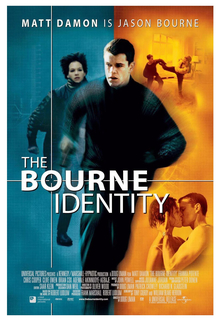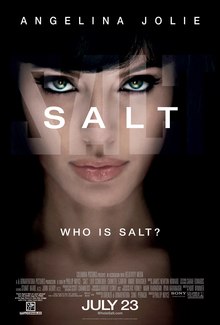The irony of the spy genre in Hollywood is that any spy who is really good at espionage is unlikely to be caught. If a spy is not detected, then there is no chance they’d have to escape via a high-octane action sequence. This would be a dull movie. Anymore, most spies are experts in the cyber domain, which makes any chances of action even less likely. Still, for those “feet on the ground” agents out in the field, knowing how to handle one’s self is a fundamental element to their survival should they be compromised. While most spy movies involve some elements of action, some have more action than others. Entire film franchises are based on spies saving the world by fighting their way out of the enemy’s clutches. So, while the action spy is a fabrication of Hollywood, it’s safe to say they’re here to stay. This week’s two films highlight some notable examples of the action spy.
The Bourne Identity
Year: 2002
Rating: PG-13
Length: 119 minutes / 1.98 hours
Most spies usually have an agency backing them. Whether it’s MI6 in the James Bond franchise, the Impossible Missions Force (IMF) in the Mission: Impossible franchise, or the eponymous U.N.C.L.E. in The Man from U.N.C.L.E. (2015), every spy has an agency giving out orders and providing logistical support to keep them armed and dangerous. But what if a spy’s agency turns on them? What if they have to not only survive with a compromised identity but survive against the agency that trained them? These spies need to think fast and move even faster. When a spy is the best of the best, it’s entertaining to watch them escape from even the most hopeless situation via their ability to fight, run, and survive by any means necessary. The epitome of this type of spy is none other than Jason Bourne.
After a botched mission, the Central Intelligence Agency (CIA) is shocked to learn that Jason Bourne (Matt Damon) has survived and now has no memories of who he is. Unfortunately, his training is so deeply ingrained in his mind that he is able to call upon his spy skills to avoid capture. From hand-to-hand combat to professional driving, Bourne uses his talents to escape to the French countryside where he eliminates The Professor (Clive Owen), a sniper sent from the same CIA black ops program Bourne was from to eliminate him. With this new knowledge of Project Treadstone, Bourne heads to the safe house in Paris to confront his handler, Alexander Conklin (Chris Cooper). Upon reaching a modicum of closure, Bourne vanishes into the night, attempting to live a peaceful life as he continues to search for his missing memories.
Salt
Year: 2010
Rating: PG-13
Length: 100 minutes / 1.67 hours
Any spy worth their salt (haha) will be able to maintain their cover, even in the most stressing of situations. As we’ve seen in films like Mr. & Mrs. Smith (2005), this cover can go so deep as to keep an individual’s spouse in the dark as to the true nature of their employment. Of course, as we also saw in that movie, once covers are compromised, action ensues in the most extreme fashion possible. Even if a spy’s spouse or significant other isn’t a spy, like in RED (2010), then there’s likely to be a greater chance said spy would need to protect themselves and their loved ones should anything go wrong. Obviously, when things go wrong with a spy, they can go wrong in a big way. There’s a reason these action spies are usually off globetrotting since the fate of the world is often in their capable hands.
Shortly after being rescued from North Korea, Evelyn Salt (Angelina Jolie) admits to her boyfriend that she is actually a CIA agent. Regardless of this, the two of them get married shortly afterward and live happily until two years later when a Russian agent arrives at the CIA and is interrogated by Salt. He tells her about a group of Russian sleeper agents and that she is one of them. Since his testimony is proven correct by a lie detector, Salt needs to immediately escape the CIA compound and head into hiding. Upon learning her husband is kidnapped, she decides to carry out the mission of her sleeper-agent self, killing the Russian President in the process. With her loyalty to the Russians now confirmed, she is given her next assignment: kill the U.S. President. When one of her CIA colleagues reveals himself to be another of the sleeper agents, Salt reveals her actions are a ruse and that she is still loyal to the U.S.
2 sum it up: 2 films, 2 exciting espionage agents




